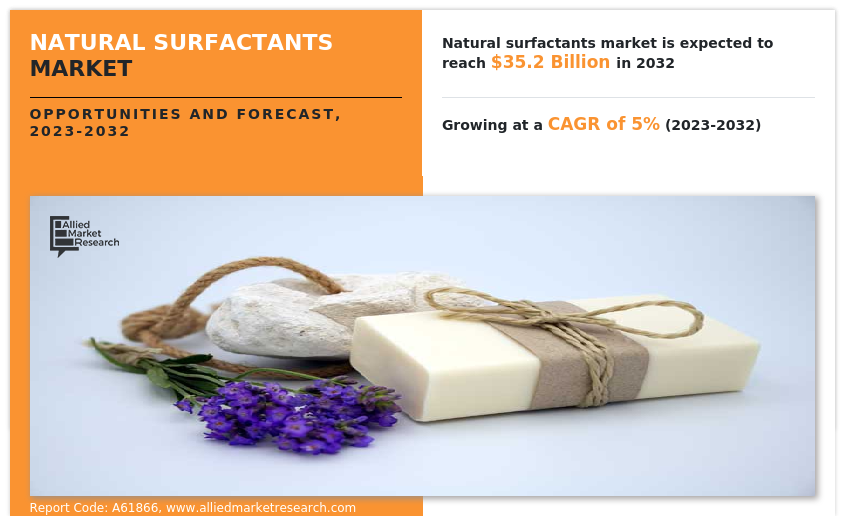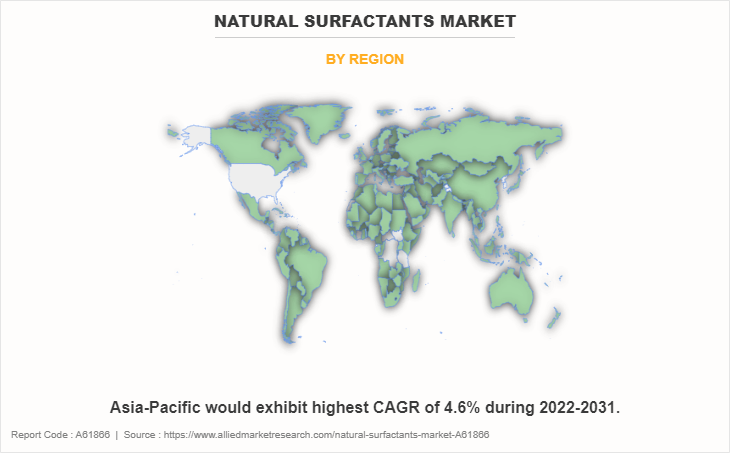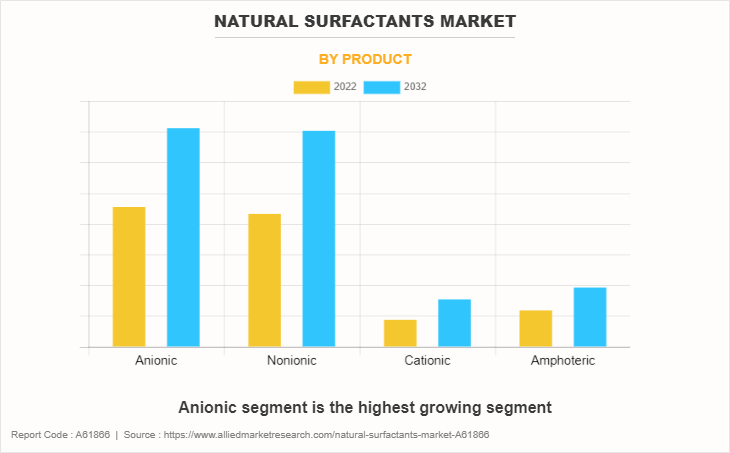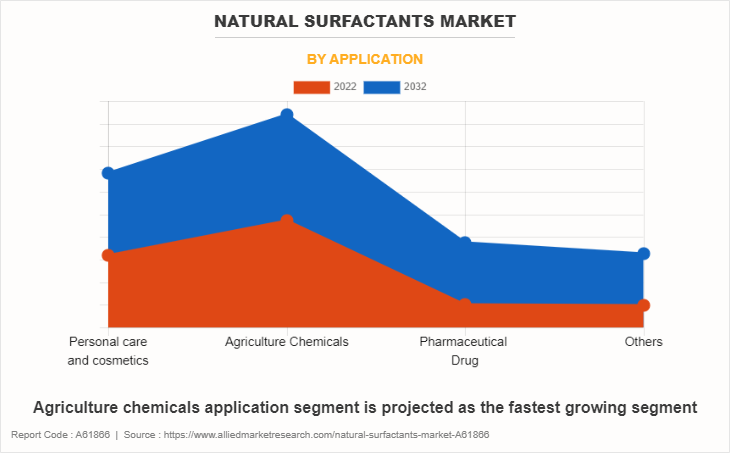Natural Surfactants Market Research, 2032
The global natural surfactants market size was valued at $21.9 billion in 2022, and is projected to reach $35.2 billion by 2032, growing at a CAGR of 5% from 2023 to 2032. The growing adoption of natural surfactants in personal care and cosmetic products is driven by consumer demand for safer, eco-friendly, and sustainable alternatives to synthetic ingredients. These products, such as shampoos, body washes, and facial cleansers, are incorporating natural surfactants due to their gentle properties, biodegradability, and reduced risk of skin irritation. As a result, these factors drive the demand for natural surfactants market in the forecast period.
Report Key Highlighters:
- The report outlines the current natural surfactant market trends and future scenario of the market from 2022 to 2032 to understand the prevailing opportunities and potential investment pockets.
- The global natural surfactant market has been analyzed in terms of value ($Million) and volume (Kilotons). The analysis in the report is provided on the basis of product, application, 4 major regions, and more than 15 countries.
- The natural surfactant market is consolidated in nature with few players such as BASF, Croda International, Indorama Corporation, Kao Corporation, Clariant AG, Innospec, Dora Agri-Tech, Lankem, Sanchi Organics Private Limited, and Kensing, LLC, which hold significant share of the market.
- The report proivdes strategy planning and industry dynamics to enhance decision making for existing market players and new entrants entering the natural surfactant industry.
- Countries such as China, U.S., India, Germany, and Brazil hold a significant share in the global natural surfactant market.

Introduction
Natural surfactants are environmentally friendly, biodegradable compounds derived from renewable resources, such as plants, vegetables, or microorganisms, used to reduce surface tension between two substances (like oil and water) to facilitate cleaning, emulsification, or foaming. As compared to synthetic surfactants, which are petroleum-based, natural surfactants are derived from natural sources such as coconut oil, palm oil, or other plant-based feedstocks. They are widely used in personal care products, cleaning agents, food processing, agriculture, and industrial applications due to their lower environmental impact, reduced toxicity, and enhanced sustainability.
Market Dynamics
Natural surfactant, also known as bio-based or plant-derived surfactant, is a surface-active compound derived from renewable plant sources. Surfactants, short for surface-active agents, are molecules that lower the surface tension between two substances, such as liquids or liquids and solids. They are commonly used in various applications, including cleaning products, personal care products, pharmaceuticals, and industrial processes. Natural surfactants offer several advantages, such as biodegradability, lower environmental impact, and potential skin-friendliness.
The rapid increase in the population in both developed and developing economies, rise in import & export of various cosmetics and skincare products, up-gradation in technology, and increased focus in the cosmetic sector drive the demand for natural surfactants. A natural surfactant acts as an antibacterial agent, which is used in formulation of various cosmetics and other skin care products that includes shampoo, conditioner, toothpaste, baby care products, and other personal hygiene care products. These factors are anticipated to offer remunerative opportunities for the natural surfactant market during the forecast period. These factors are expected to propel the growth of the natural surfactant market during the forecast period.
However, in some cases, natural surfactants do not perform as effectively as synthetic alternatives in terms of foaming, detergency, or other desired properties. Manufacturers need to find a balance between natural ingredients and performance. In addition, natural surfactants are often perceived as safer and more environmentally friendly, however, they still need to meet regulatory standards and certifications. Meeting these requirements involves additional testing and documentation. This factor is projected to restrain market growth.
On the contrary, consumer awareness and concern about environmental sustainability have led to an increased demand for products made from natural and biodegradable ingredients, including surfactants. Natural surfactants are often derived from renewable resources and tend to have lower environmental impacts compared to their synthetic counterparts. This is anticipated to increase sales of natural surfactants; thus, creating lucrative opportunities for market expansion.
The natural surfactant market is segmented on the basis of product, application, and region. On the basis of product, the market is categorized into anionic, nonionic, cationic, and amphoteric. On the basis of application, the market is classified into personal care & cosmetics, agriculture chemicals, pharmaceutical drug, and others. Region-wise, the market is studied across North America, Europe, Asia-Pacific, and LAMEA.

The Asia-Pacific natural surfactant market accounted for 41% of natural surfactant market share in 2022 and is projected to grow at the highest CAGR of 4.6% during the forecast period. The region is showcasing high potential growth for natural surfactant, owing to the increase in the pharmaceutical sector where natural surfactant has been used predominantly. It is mainly used in the formulation of various drugs and disinfectants. This factor act as one of the key drivers responsible for the growth of natural surfactants in the region. In addition, the increasing demand for processed foods has surged the growth of food and beverages in Malaysia and China where natural surfactant is used as an emulsifier and foaming agent.
The exponential increase in the world's population that leads to a rise in the proliferating demand for food and increasing its contribution to the world food trade has led to the growth of the overall agriculture sector. For instance, according to a report published by India-China Trade Brief in the year 2018-19, India’s total export of agricultural and allied commodities to China was of the order of $1999 million, approximately 117% higher than the previous year. Natural surfactant is mainly used as bio-based pesticide and soil conditioning agent. This factor is anticipated to increase in the potential sales of natural surfactant in the agriculture sector.

By product, the anionic segment dominated the global market in 2022, and is anticipated to grow at a CAGR of 4.7% during the forecast period. As consumers become more conscious of the products they use and their potential impact on health and the environment, there is a growing demand for products formulated with natural ingredients, including anionic surfactants. This demand drives industries to explore and utilize natural surfactants in their formulations.
Anionic-based natural surfactants are used in a wide range of applications, including personal care products, household cleaners, agricultural formulations, food products, and industrial processes. Their versatility and compatibility with various industries contribute to their widespread adoption. Furthermore, ongoing research in the field of biotechnology and natural product chemistry has led to the discovery of new sources of anionic-based natural surfactants and improved methods for their extraction and production.

By product, the agriculture chemicals segment dominated the global market in 2022, and is anticipated to grow at a CAGR of 5.0% during the forecast period. Increase in the utilization of various natural surfactants has boosted the market growth. In addition, factors such as an increase in the population in developed and developing economies, rising demand for food across the globe, and government support and investment in the production of agrichemicals have driven market growth. For instance, according to a report published by India Brand Equity Foundation in January 2021, the government plans to introduce a production-linked incentive (PLI) scheme to promote domestic manufacturing of agrochemicals.
The global natural surfactant market profiles leading players that include BASF, Croda International, Indorama Corporation, Kao Corporation, Clariant AG, Innospec, Dora Agri-Tech, Lankem, Sanchi Organics Private Limited, and Kensing, LLC.
The global natural surfactant market report provides in-depth competitive analysis as well as profiles of these major players.
Key Benefits For Stakeholders
- This report provides a quantitative analysis of the market segments, current trends, estimations, and dynamics of the natural surfactants market analysis from 2022 to 2032 to identify the prevailing natural surfactants market opportunities.
- The market research is offered along with information related to key drivers, restraints, and opportunities.
- Porter's five forces analysis highlights the potency of buyers and suppliers to enable stakeholders make profit-oriented business decisions and strengthen their supplier-buyer network.
- In-depth analysis of the natural surfactants market segmentation assists to determine the prevailing market opportunities.
- Major countries in each region are mapped according to their revenue contribution to the global market.
- Market player positioning facilitates benchmarking and provides a clear understanding of the present position of the market players.
- The report includes the analysis of the regional as well as global natural surfactants market trends, key players, market segments, application areas, and natural surfactants market growth strategies.
Natural Surfactants Market Report Highlights
| Aspects | Details |
| Market Size By 2032 | USD 35.2 billion |
| Growth Rate | CAGR of 5% |
| Forecast period | 2022 - 2032 |
| Report Pages | 274 |
| By Product |
|
| By Application |
|
| By Region |
|
| Key Market Players | Dora Agri-Tech, Indorama Corporation Limited, BASF SE, Kao Corporation., Sanchi Organics Private Limited, Lankem Surfactants, Kensing, LLC., Innospec Inc., Croda International Plc, Clariant AG. |
Analyst Review
According to CXOs of leading companies, the global natural surfactant market is expected to exhibit high growth potential. This is due to the fact that regulatory agencies across the globe have been imposing stricter regulations on chemicals used in various industries, including personal care, cleaning, and agriculture. Natural surfactants are perceived to be safer and less harmful to human health and the environment, making them an attractive option for manufacturers looking to comply with these regulations.
In addition, rise in concern from governments across emerging nations, such as China, India, and South Korea, regarding bio-based skin care products are expected to drive the market growth. Governments across different countries implement new initiatives and schemes on producing bio-based surfactant. This is expected to enhance the market penetration in new customer segments.
The CXOs further added that sustained economic growth and the development of the personal care and cosmetics sector have surged the popularity of natural surfactant market.?
Natural surfactant, also known as bio-based or plant-derived surfactant, is a surface-active compound derived from renewable plant sources. Surfactants, short for surface-active agents, are molecules that lower the surface tension between two substances, such as liquids or liquids and solids. They are commonly used in various applications, including cleaning products, personal care products, pharmaceuticals, and industrial processes. Natural surfactants offer several advantages, such as biodegradability, lower environmental impact, and potential skin-friendliness.
Agriculture Chemicals is the leading application of natural surfactant market.
The natural surfactant market is segmented on the basis of product, application, and region. On the basis of product, the market is categorized into anionic, nonionic, cationic, and amphoteric. On the basis of application, the market is classified into personal care & cosmetics, agriculture chemicals, pharmaceutical drug, and others. Region-wise, the market is studied across North America, Europe, Asia-Pacific, and LAMEA.?
BASF, Croda International, Indorama Corporation, Kao Corporation, Clariant AG, Innospec, Dora Agri-Tech, Lankem, Sanchi Organics Private Limited, and Kensing, LLC.
Asia-Pacific is the largest regional market for natural surfactant.
Consumer awareness of the environmental impact of chemicals and their desire for sustainable, eco-friendly products were driving the natural surfactant market. Brands were increasingly formulating products with natural surfactants to meet this demand.
The Natural Surfactants Market was valued for $21.9 billion in 2022 and is estimated to reach $35.2 billion by 2032, exhibiting a CAGR of 5% from 2023 to 2032.
Loading Table Of Content...
Loading Research Methodology...


